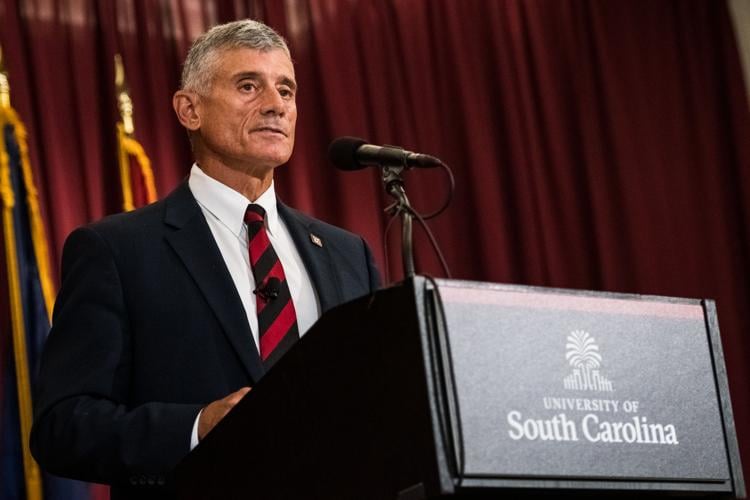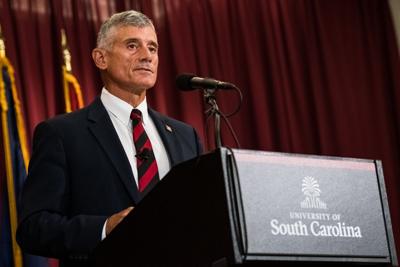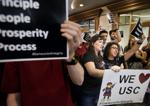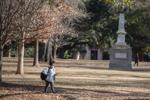COLUMBIA — More than four months after resigning as president at the University of South Carolina amid a plagiarism scandal, Bob Caslen remains bitter about how his 21-month tenure ended.
“The biggest regret of my life is that I went to University of South Carolina,” Caslen told The Post and Courier on Sept. 30. “If I had to do it all over again, I would never have gone to the University of South Carolina.”
Caslen’s statement was prompted by the release of emails from a week in May when he delivered commencement addresses with uncredited material, resigned after a barrage of criticism and was replaced by former USC President Harris Pastides.
In those emails, Caslen, a retired three-star Army general and combat veteran who ran West Point, called USC the most hostile community he had ever encountered.
“This place sucks so bad,” Caslen wrote to then-S.C. State University President James Clark on May 9 as social media criticism grew over his addresses delivered during the previous two days. “I don’t know how anyone can stand it. At some point you have to ask why do you put up with this stuff. It is insane. I don’t know how you can stand living here.”
After USC Student Affairs Vice President Dennis Pruitt sent an email praising the commencement exercises, Caslen replied: “I can’t help but comment on this community and its hostility. By far the most hostile and destructive community I’ve ever been a part of. Not sure how anyone can stand being here, and those of you who have been here a while — I have the utmost respect for your perseverance.”
Caslen, 67, did not back away from his comments in a recent interview.
“You have a good description of what I felt and what my wife felt,” Caslen told The Post and Courier. “If I were a member of the South Carolina community, I would ask myself, ‘Why does a guy like him who's been in all these different communities throughout his entire life, feel this way about our community?’ ”
Caslen said he was used to criticism as a senior Army officer and a leader at West Point, where he dealt with professors, parents, alumni and politicians. But USC was different.
“There's a degree of respect and professionalism that exists within those communities that does not exist at the University of South Carolina,” Caslen said. “It’s just, ‘I want to do whatever is necessary to tear you down; I will do that.’
“That's South Carolina, whether that comes from the Legislature. whether that comes from the alumni, whether that comes from certain faculty or students. That's the way they operate.”
Despite the treatment he described receiving, Caslen said he planned to stay at USC for three to five years: "I made a commitment and I would honor my commitment."
Caslen took responsibility for the plagiarism, which he said was not intentional. He told The Post and Courier that he offered to resign every time he spoke with USC board Chairman Dorn Smith after the speeches, but his requests were rejected repeatedly over four days.
“My first comments to Dorn were that, ‘This is not good, and if it gets to a point where it becomes national news or it discredits the university, then you're going to need somebody else and I will resign,’ ” Caslen said. “Every day I talked to him, I said, ‘I'm ready to resign. Don't pull the university through all this. I will leave.’ "
Smith was more concerned about the president mistakenly congratulating graduates for getting diplomas from the “University of California” at the end of one commencement ceremony than about the plagiarism repeated during three events, Caslen said. Smith did not return multiple messages.
Circumstances changed by the evening of May 12, when Smith finally accepted the president’s resignation.
“Things were elevating. It got to CNN. It got to The Washington Post. It got to the national level,” Caslen said. “I lost trust. I lost public trust, and I lost trust with faculty and students. And when you lose trust, there's no way you can lead.”
Caslen struggled to win approval at USC after he arrived in 2019 as the result of a troubled presidential search. The search was tainted by accusations that the school failed to come up with a full slate of qualified finalists and trustees were influenced by lobbying from Gov. Henry McMaster, who wanted Caslen despite his lack of a traditional background for a major university leader.
The board initially voted to reopen the search rather than pick one of four finalists. Caslen, who was considered the favorite, opted out of consideration, but a group of USC trustees visited his Florida home and changed the general's mind.
Caslen was elected president in a contentious 11-8 vote that took place with protesters shouting outside the boardroom.
The division that search created never fully healed, even after Caslen was credited for how well he guided USC through the COVID-19 pandemic, bolstered diversity in the administration and worked to win more cutting-edge military research work.
Caslen said that some USC trustees were waiting for a moment to pounce when he made a mistake.
“It was just like the community, the people who didn't want me to be here just tolerated me,” Caslen said in an interview. “What was amazing to me was to watch the reaction of (some) board members when the commencement went down because people who I thought had turned the corner, being nice to me and inviting me down to their house, all of a sudden just turned away from me.”
As USC searches for a new president, Caslen suggested his potential successors look at his experience in Columbia.
“Of course, they will say, ‘Well, you're not a Bob Caslen and you’re the right fit and he was the wrong fit,’ ” he said. “My advice is make sure you come with your eyes open because I regret coming to the University of South Carolina.”
In a statement issued Oct. 1, USC said it was grateful for Caslen's service: "We wish him all the best in his future endeavors."
What emails reveal
Under a public records request, The Post and Courier received nearly 3,800 pages of emails to Caslen, Pastides and the USC board covering a nine-day period from Caslen’s Columbia commencement speeches and just after trustees formally hired Pastides as interim president.
The messages reveal the anger USC leaders faced after Caslen's “University of California” and plagiarism missteps, the support the president received from a community he has said despised him, and the relief at Pastides’ return from retirement after an 11-year run leading the university.
Caslen’s emails showed how he took responsibility for failing to credit material from a commencement speech given by Admiral William McRaven, who oversaw the raid that killed terrorist Osama bin Laden. McRaven himself told Caslen that he was not offended.
But the messages also showed how Caslen remained angry over his treatment by some university staff and alumni.
“They can do what they want with me,” Caslen wrote to a campus minister on May 11, the day before he resigned. “So if they want me to go, then that would be a liberation!”
Supporters sent messages to trustees asking Caslen to stay as calls for his ouster grew in the days after his gaffes.
“He is a war hero who ran into the Pentagon when it was on fire to save others. He saved our asses during COVID pandemic,” Phillip Buckhaults, a USC cancer genetics professor, wrote. “You owe him a wide lane on this minor infraction. Do not embarrass the University of South Carolina brand by pretending that this guy is somehow not up to our standards of honor. ... Tell the mob to go home.”
But critics questioned why Caslen was allowed to linger in his job.
“As the parent of an incoming USC student, I am already seriously considering forcing him to transfer,” a parent whose name was redacted wrote to the board on May 8. “He’s made USC graduation the laughing stock of the country. What are you waiting on to remove him?”
Andrew Patterson, a physical therapist, wrote: “To have him sully and ruin what should be our students most proud day is humiliating. I have never been less proud of my alma mater and am afraid it will only get worse as long as he is our leader.”
Reports that the board did not accept Caslen’s initial offers to resign drew angry responses.
“The man even tried to resign, and this inept and irresponsible board told him no? What is the matter with you people?” said an email signed by a “deeply disappointed alumnus of the University of California.”
Wrong USC
May 7 started with some typical work for a university president, emails showed.
Caslen got messages about edits to an announcement naming Pharmacy School Dean Stephen Cutler as interim provost with Bill Tate heading to Louisiana State University, negotiations in replacing the school’s head of research, preparations for U.S. Rep. Jim Clyburn's visit to the Salkehatchie campus to talk about broadband and reservations for a Mother’s Day brunch.
That night, Caslen would lead the first of three commencements at Williams-Brice Stadium over two days.
Near the end of the roughly three-hour, in-person and livestreamed ceremony, a slip of the tongue would propel the first-term president to viral status.
He congratulated graduates of the “University of California.” The gaffe earned Caslen a mix of laughs, boos and confused remarks from the remaining crowd, which by that time had dwindled.
A number of students and alumni took to social media upset that the president didn't appear more prepared for the occasion. The remark was painful to many in the university community because of a longstanding fight with the University of Southern California over the right to use the "USC" abbreviation.
The next day, John von Lehe, who was board chairman when Caslen was hired, emailed to tell the president to keep his head up.
“We have weathered a lot worse than this,” von Lehe wrote. “Consider it a ‘bump in the road’ toward our goal of excellence.”
In an interview, Caslen said he was distracted that night by graduates leaving the stadium after getting their diplomas, drinking in their seats and shouting to relatives in the stands. He also said he was a bit tired after hours in the May heat.
Still, he admitted, “A higher standard is expected, and I failed to meet the higher standard when I said California not Carolina.”
But that was just his first problem.
Plagiarism discovered
Caslen repeated uncredited lines from McRaven, the admiral, during all three USC commencement ceremonies on May 7 and 8 in Columbia, according to a review of university videos.
The passage, first used during a 2014 graduation ceremony at the University of Texas, was added after Caslen said he noticed that his earlier commencement speeches did not commend students for getting through the COVID pandemic.
“I told my speechwriter, ‘Someone’s got to say, ‘You did great job.’ I need something about resilience and I need something about persevering in tough times,’ ” Caslen said. “And there was that McRaven quote, and I said, ‘Put it in there.’ ”
The lines, which were found among inspirational quotes Caslen collected in a book, were added without attribution, according to copies of the speeches USC provided.
Media reports about the plagiarism began to surface in the days after the speeches.
“This is worse,” Pastides said in an email after he was forwarded a news story.
Caslen sent apologies to the board on May 9 and to the public on May 10.
Several members of the university community said they were upset he did not mention the University of California comment in his apology.
“You have forever tarnished that day for me, my family, and my classmates. From now on, when someone asks me when I graduated and I tell them, their response will be ‘Oh, I remember that. Isn't that when the president didn't know the name of the school?’" wrote a graduate whose name was redacted as the university said it was complying with federal privacy laws.
University leaders were more charitable.
Former USC President John Palms wrote: “I appreciate your sending this. Stay well.”
USC Honors College Dean Steve Lynn noted that an inadvertent unattributed quote would warrant nothing more than a caution for a student: “There’s a clear distinction between an oversight, an innocent mistake on the one hand, and an intention to deceive on the other hand.”
Caslen repeatedly took the blame for the omission in responses to emails, including one to Stanley McChrystal, a former U.S. commander in Afghanistan, using the same statement — “I said it and I own it.”
In an interview, Caslen said, “I'm not going to throw my speechwriter under the bus, but, having said that, speechwriters’ normal responsibility is to ensure that whatever is said by the boss is legitimate.”
Caslen said, he never told the speechwriter that she should have caught the error.
“I did not want to pass the blame,” he said. “I'm a man of integrity. If I started having those conversations, it would be me shirking my responsibility and I was not going to do that.”
In the days soon after the speeches, Caslen tried to go on with school business.
He worked to help a student with trouble finding housing, emailed the parent of a potential business school student, sought information on a student who was assaulted on campus and reviewed legislative initiatives and a research proposal related to laser technology, emails showed.
But it was clear the swirling controversy was troubling him.
“I’ve been thinking more about what you told me this morning about the incident at graduation. You, understandably, seemed both troubled by the response and upset that it happened,” an exercise partner wrote before offering words of encouragement.
After the apology went out, more letters of support began to pour into Caslen’s inbox, including one from McRaven.
“Candidly, I was flattered that you would find my words worth repeating," McRaven wrote. "Rest assured you never, ever owe me an apology for anything — period."
One after another, university personnel, parents and students wrote to say they stood behind him, thanking him for his work guiding the school through the coronavirus pandemic. The head of the faculty senate sent an email that said there were still concerns, but the apology helped.
There were also detractors who called the incident embarrassing and the apology not enough.
“How can you effectively lead, at this level, at this position going forward? What would you say to a student guilty of an honor violation of this nature? What COULD YOU say?” wrote a person whose name was redacted from documents by the university, citing federal education privacy law.
By May 11, Caslen and his team were still trying to finalize agreements for a new set of online courses and announce the search for a new head of research, but it became clear the events of graduation were becoming all-consuming, based on Caslen’s correspondence.
The next day, Caslen wrote to inform Michael Matthews, the co-author of his book, “The Character Edge: Leading and Winning with Integrity,” of what was happening. Caslen was worried over the impact on podcasts and book sales, and they began strategizing over how to handle an upcoming speaking engagement.
By that evening, Caslen was done at USC.
"Things are going in the wrong direction here (faculty and students), so I submitted my resignation this evening and my Board Chair accepted it," Caslen wrote to Matthews.
Matthews suggested later that they continue with the speaking event, telling Caslen he has the support of their hosts. Caslen thanked Matthews, telling him, “It is a very lonely place right now … I’ll be looking for venues to defend my own personal character, and hopefully this may be an opportunity to do so.”
Caslen began making plans for moving out, just two hours after he told top university leaders about his resignation.
“I want to get out of here as quickly as possible,” he wrote to a staffer.
Caslen spent his final days responding to notes of support, many from the university and his circle of military friends, stating they know his character and stand behind him, including West Point’s superintendent and the president of its alumni association.
Despite everything, many in the USC community stood beside him.
“I believe you singlehandedly brought USC back from the brink when all other universities of our caliber were shell-shocked by COVID," wrote Hossein Haj-Hariri, who heads USC's engineering and computing departments. "We would have been in a very different place with a traditional president."
Patricia Witherspoon wrote: “To err is human. I’m extremely disappointed that other humans can’t extend grace!”
Caslen received messages that he was a victim of cancel culture.
“You, like President Trump, were never given a chance to succeed and for that I am truly sorry,” USC alum Amy Dawson wrote. “I don’t know what happened to our school.”
A group of recent graduates invited him to come to Jake’s for a beer in Five Points.
“(Let me know) when you’re on the way. Drinks on me!,” the student wrote.
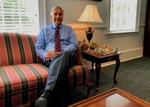
University of South Carolina Interim President Harris Pastides is leading the school while a search is conducted. Cindi Ross Scoppe/Staff
Pastides returns
USC announced Pastides’ temporary return when Caslen resigned, which was welcome news to many.
“Relieved that you are back, even if it’s only on an interim basis. I hope that you can influence the board to pick someone like yourself who will bring honor and respect to our state university,” retired Michelin North America President Richard Wilkerson wrote.
Staff expressed their appreciation for their former boss and his wife to end their retirement in Folly Beach.
“I admire you all the more for agreeing to step back in the fray and help the university we all love so much to heal and move forward,” USC Enrollment Vice President Scott Verzyl wrote. “You and Patricia are making quite a sacrifice and I greatly appreciate it.”
Dr. Marjorie Jenkins, dean of the USC School of Medicine in Greenville, joked: “I wasn’t sure if I should send you condolences or congratulations.”
And, in light of the way Pastides was back in office, university staff had a public relations firm check Pastides’ speeches for plagiarism.
“Everything we’ve scanned so far gets a clean bill of health for original authorship and the proper use of citations,” Jon Hukill, a vice president at Washington, D.C.-based kglobal, wrote in an email. “We’ve come across no red flags.”
Thad Moore contributed from Charleston.

